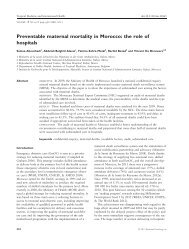Preventing Childhood Obesity - Evidence Policy and Practice.pdf
Preventing Childhood Obesity - Evidence Policy and Practice.pdf
Preventing Childhood Obesity - Evidence Policy and Practice.pdf
Create successful ePaper yourself
Turn your PDF publications into a flip-book with our unique Google optimized e-Paper software.
CHAPTER 26<br />
Community i nterventions — planning<br />
for s ustainability<br />
Anne Simmons, 1 Jean Michel Borys 2 <strong>and</strong> Boyd Swinburn 1<br />
1 WHO Collaborating Centre for <strong>Obesity</strong> Prevention, Deakin University, Geelong <strong>and</strong><br />
Melbourne, Australia<br />
2 EPODE European Network, Paris, France<br />
Summary <strong>and</strong> recommendations<br />
for research <strong>and</strong> practice<br />
• Well-evaluated community-based obesity prevention<br />
programs are needed to provide the evidence<br />
of effectiveness of such approaches.<br />
• Selection of priority communities for program<br />
implementation should take account of needs (e.g.<br />
level of disadvantage) as well as likelihood of success.<br />
• A capacity building approach should underpin<br />
implementation of obesity prevention programs.<br />
• Health promotion principles are applied to community<br />
engagement, program planning <strong>and</strong> implementation,<br />
<strong>and</strong> evaluation design, but these are<br />
inherently complex <strong>and</strong> contextual.<br />
• Sustainability must be built in from the start, <strong>and</strong><br />
means placing a higher priority on policies <strong>and</strong><br />
capacity building than on events, awareness raising<br />
<strong>and</strong> education.<br />
• Future challenges include securing sufficient investment<br />
in programs <strong>and</strong> evaluations, incorporating<br />
socio - cultural aspects, <strong>and</strong> moving from implementing<br />
individual projects to reorienting existing<br />
systems towards contributing to the obesity prevention<br />
efforts.<br />
Introduction<br />
Community level action to promote healthy eating<br />
<strong>and</strong> physical activity is a central component of obesity<br />
<strong>Preventing</strong> <strong>Childhood</strong> <strong>Obesity</strong>. Edited by<br />
E. Waters, B.A. Swinburn, J.C. Seidell <strong>and</strong> R. Uauy.<br />
© 2010 Blackwell Publishing.<br />
prevention efforts. Ideally, these actions should<br />
complement wider state - or national - level action,<br />
particularly policy actions needed to make environments<br />
less obesogenic. 1 In practice, programs at<br />
the community level are being established much<br />
more rapidly than policies at a state or national level.<br />
At this stage, however, the evidence base for what<br />
works <strong>and</strong> what does not work at a community level<br />
is relatively narrow, 2,3 therefore there is an imperative<br />
to properly evaluate major programs that are<br />
being implemented. 4 Establishing well evaluated<br />
demonstration projects is critical for creating the<br />
evidence about what works for whom, why, <strong>and</strong> for<br />
“ what cost? ”<br />
The planning, implementation <strong>and</strong> evaluation of<br />
community intervention programs takes several years.<br />
This is especially the case if the programs are large <strong>and</strong><br />
multi - faceted, if the structures <strong>and</strong> organizational<br />
relationships need to be built from scratch, if the<br />
stakeholder groups are numerous or require substantial<br />
relationship building, or if the resources <strong>and</strong> leadership<br />
support are low. Sustainability issues are often<br />
not high on the agenda in the early stages as people<br />
are immersed in community consultations, hiring<br />
staff, setting up governance structures, developing<br />
action plans, <strong>and</strong> so forth. However, as the evidence<br />
of long - term effectiveness of interventions emerges,<br />
the focus of choosing more sustainable action should<br />
increase.<br />
Basic health promotion principles for the implementation<br />
of any community programs include:<br />
the need for community engagement <strong>and</strong> capacity<br />
building; program design <strong>and</strong> planning, including<br />
governance <strong>and</strong> management structures; implementa-<br />
220

















